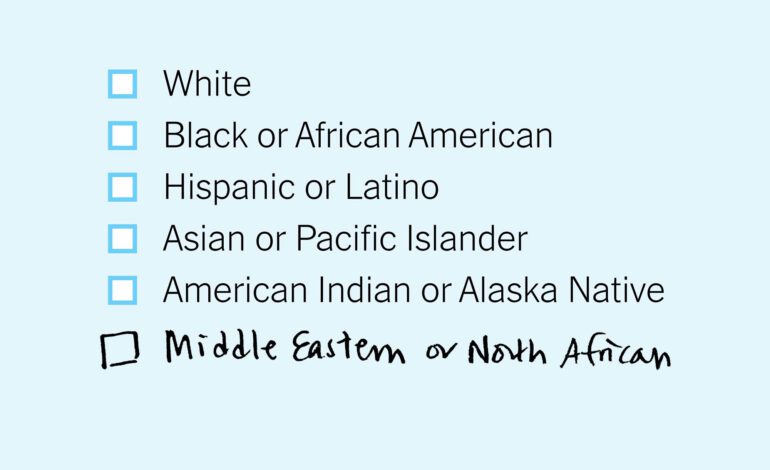WASHINGTON, D.C. — The Biden administration is proposing major changes to forms for the 2030 Census and federal government surveys that would transform how Latinos and people of Middle Eastern or North African descent are counted in statistics across the United States.
A new checkbox for “Middle Eastern or North African” and a “Hispanic or Latino” box that appears under a reformatted question asking for a person’s race or ethnicity are among the early recommendations announced in a Federal Register notice, which was made available Thursday for public inspection ahead of its official publication.
If approved, the changes would address longstanding difficulties many Latinos have had in answering a question about race that does not include a response option for Hispanic or Latino, which the federal government recognizes only as an ethnicity that can be of any race.
The reforms would also mark a major achievement for advocates for Arab Americans and other MENA groups who have long campaigned for their own checkbox. While the U.S. government currently categorizes people with origins in Lebanon, Iran, Egypt and other countries in the MENA region as White, many people of MENA descent do not identify as White people. In addition to a new box on forms, the proposal would change the government’s definition of “White” to no longer include people with MENA origins.
Research by the Census Bureau suggests both the addition of a “Middle Eastern or North African” box and a combined question about race and ethnicity could decrease the number of people who identify as White for the national head count.
The recommendations come from a group of career civil servants who have been reviewing how to make data produced by the U.S. government better reflect the country’s diversity. The last update to the standards on racial and ethnic data that the Census Bureau and other federal agencies must follow, in addition to any related federal laws, took place in 1997.
“It’s important to remember that the recommendations are preliminary— not final — and they do not represent the positions of OMB or the agencies participating on the Working Group,” stressed Karin Orvis, U.S. chief statistician within the White House Office of Management and Budget, which sets statistical standards for the federal government, in a blog post.
Biden officials revived this multiyear review effort, which began in 2014, after it was stalled by former President Trump’s administration. That delay blocked the bureau from carrying out long-awaited changes to the 2020 Census form that the agency’s research found were likely to improve the accuracy of the racial and ethnic data used to redraw voting districts and enforce civil rights protections, as well as guide policymaking and research.
Another proposal would remove outdated language from the government’s current racial and ethnic data policy, including “Negro” as a term to describe the “Black” category and “Far East” to describe a geographic region of origin for people of Asian descent. The terms “majority” and “minority” would also no longer be used, echoing a move the Census Bureau announced in 2021 to better describe the country’s changing demographics.
Any revisions to the federal data standards are expected to spur far-reaching changes to how many state and local governments and private institutions generate their racial and ethnic data.
The Office of Management and Budget is expected to make a final decision on the working group’s proposals by summer 2024.
Until then, the OMB is asking for members of the public to weigh in by April 12 with their feedback, which the working group says will be factored into their final recommendations.
Thursday’s rollout of these preliminary proposals was met with relief from many census watchers who had expected a similar set of recommendations to be enacted ahead of the 2020 count before Trump officials halted the review process.
“For more than two decades, federal data gathering standards have limited our ability to identify disparities faced by Arab Americans in Michigan and across the nation,” Democratic Sen. Gary Peters of Michigan, who chairs the Homeland Security and Governmental Affairs Committee, said in a written statement. “That is why I have long pushed for a separate category for this vibrant community and today’s announcement is a significant step to ensuring the federal government can better serve this population. These proposals will help ensure federal data accurately reflects the diversity of our nation – and I urge OMB to adopt them quickly following the public comment period.”
Peters has repeatedly pressed for more accurate federal data related to the MENA population. Last year, he urged the OMB to revise race and ethnicity standards and include a separate category for people of MENA descent.






Leave a Reply